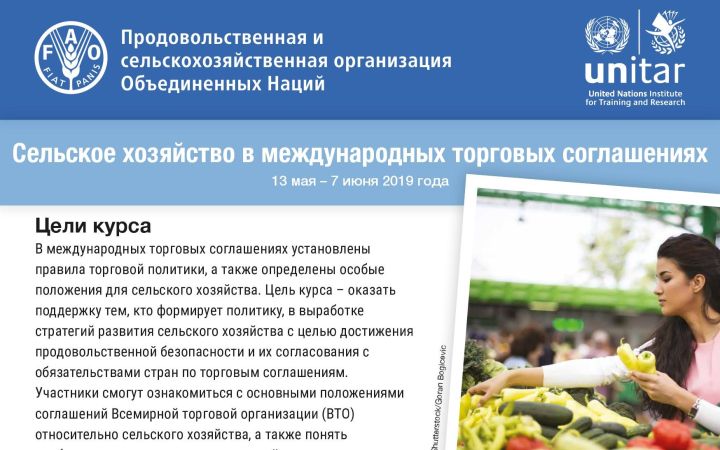2 July 2019, Geneva, Switzerland - The Food and Agriculture Organization of the United Nations (FAO) and the United Nations Institute for Training and Research (UNITAR) have successfully delivered a joint online course on Agriculture in International Trade Agreements in Russian for the eleven countries of Europe and Central Asia, also known as the post-Soviet countries, namely Armenia, Azerbaijan, Belarus, Georgia, Kazakhstan, Kyrgyzstan, Moldova, Russia, Tajikistan, Ukraine and Uzbekistan.
The four-week course which was conducted from 13 May to 7 June 2019 was successfully completed by 66 participants with a completion rate of 82,5%.
Strong demand and positive results
The course received the highest demand among the FAO-UNITAR online courses delivered in this region over the past years, with 662 applications received, of which 62% submitted by women who occupy middle- and senior-level positions in ministries, research institutions, academia, the private sector and non-commercial organizations and are directly involved in the formulation and implementation of trade or agricultural policies in the target region.
After the careful selection process, FAO selected 80 participants to take part, including almost 50% of women. The criteria for selection focused on geographical distribution, gender balance, the role the participants might play in formulating agricultural and trade policy after the course, and the impact that they would be able to have upon completing the course.
During the 4 weeks of studies, the participants were expected to cover several course-related activities including 3 learning modules, 2 interactive packages, 3 weekly randomized assessment quizzes and participation in the 8 discussion forums mentored by FAO experts.
A course participant with a senior position in an Armenian NGO commented that:
“I was really impressed with how active the participants were, which shows high demand for discussions and communication within the professional community in our region.”
It is interesting to note that based on successful participants, 70% were women and indicated that they were more eager to gain new knowledge and skills and fully complete the course requirements. The course interactions also showed the positive tendency and demand for knowledge sharing activities in this area among female professionals in the post-Soviet countries.
During the course evaluation stage, the participants were extremely positive and gave high marks on the course content, methodology, mentoring by the experts, and course administration which contributed to the achievement of their individual learning objectives.
“During the course, I was pleased to read the opinions and advice of the FAO experts and colleagues from our region. The weekly discussions were impressively enriching and played a very important role in the learning process”
was a comment made by a senior official from the Ministry of Economic Development and Trade of Tajikistan.
Overall, the participants indicated that 98.2% have mostly and fully achieved the learning objectives. Moreover, the course had an immediate impact on the participants with one female participant with a senior position from Ukraine mentioning that the online course inspired her to change dramatically her career path:
“I decided to change my professional orientation and move from private sector to public administration in the field of agricultural sector reform in Ukraine. I had just applied for a position in our Ministry of Agriculture and your Certificate definitely added weight to my CV.”
The online course covered global issues as well as key topics with a specific focus on the post-Soviet countries such as regional experiences in implementing multilateral and regional trade agreements in this region.
The aim of the course was to strengthen the capacities in the targeted countries; assist the local practitioners to better understand the international regulatory frameworks governing trade and its implementation mechanism as well as the eventual implications of the recent WTO Ministerial Conferences; discuss the significance of non-tariff measures (NTMs) on the international trade and the relevance of WTO Agreements regarding such measures on the national trade policies; understand the main obligations on agriculture of post-soviet countries within multilateral and regional trade agreements.
History of Successful Collaboration
Over the past five years, UNITAR's collaboration with FAO has continued to grow with over a dozen of agriculture and trade-related courses developed and delivered for the benefit of over 1000 beneficiaries globally with a large part coming from Africa and Central Asia.
The course on Agriculture in International Trade Agreements is part of FAO’s Regional Initiative for Improving Agrifood Trade and Market Integration in Europe and Central Asia.
ABOUT FAO
FAO is a specialized agency of the United Nations that leads international efforts to defeat hunger. The goal is to achieve food security for all and make sure that people have regular access to enough high-quality food to lead active and healthy lives. With over 194-member states, FAO works in over 130 countries worldwide. For more information, visit www.fao.org


